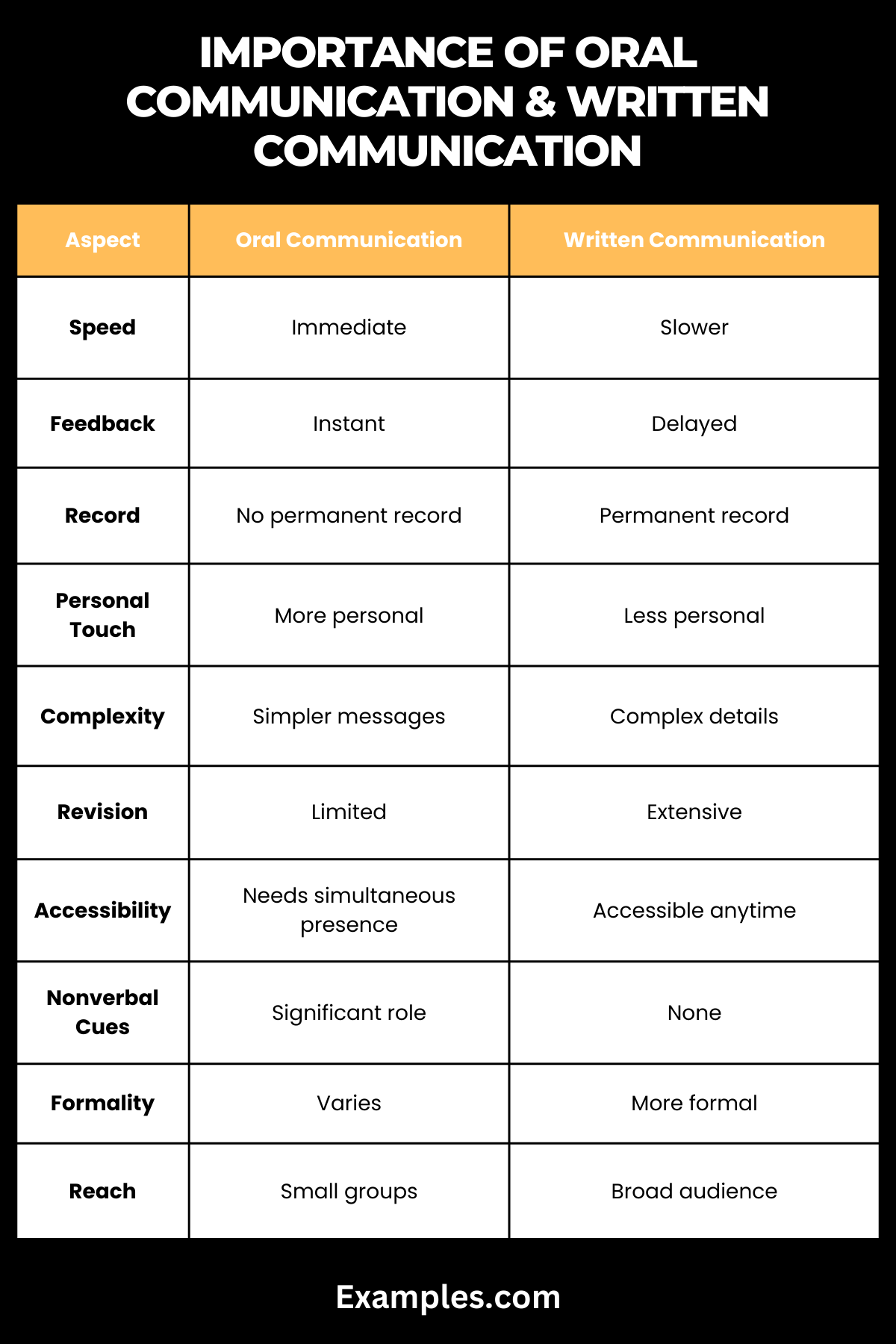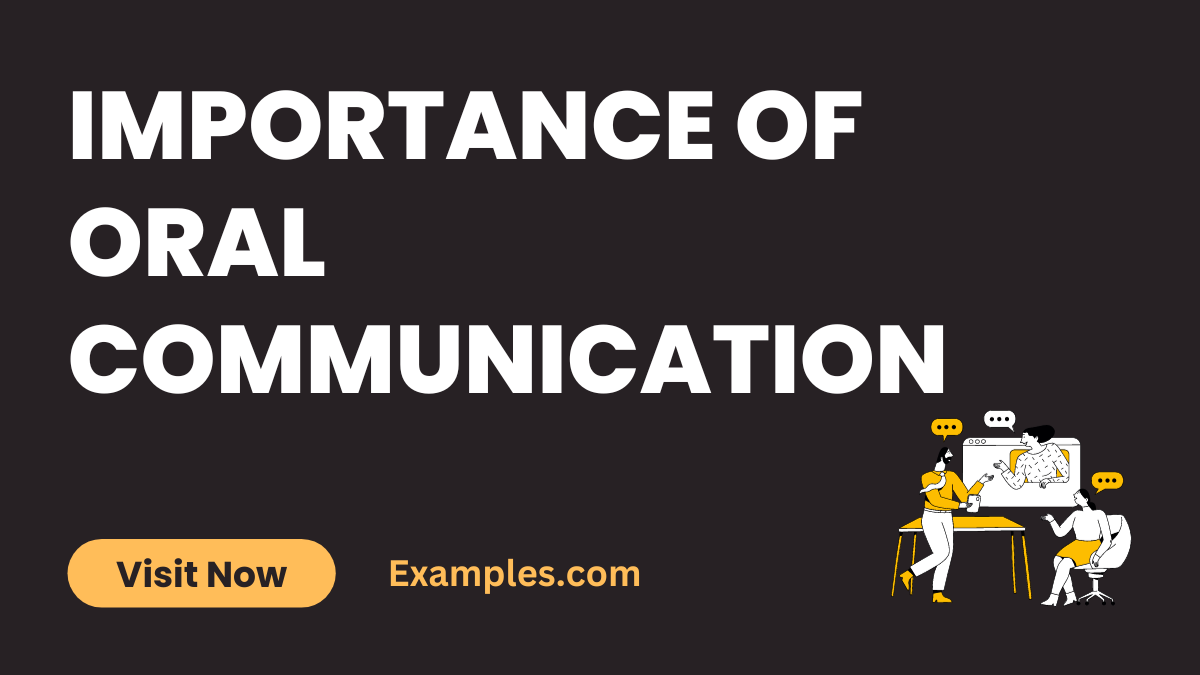Importance of Oral Communication
Embark on a journey to understand the crucial role of oral communication in shaping our interactions and relationships. This guide provides an in-depth look at effective communication strategies, enriched with practical oral communication examples. From professional discussions to personal dialogues, learn how to harness the power of spoken words for impactful and meaningful connections. Our guide is tailored to equip you with the skills necessary for mastering the art of oral communication in various life scenarios.
What is the Importance of Oral Communication?
Oral communication is the process of exchanging information and ideas through speaking. It is a key aspect of human interaction, essential for understanding and being understood in both personal and professional contexts. This form of communication is valued for its immediacy and effectiveness. What is Oral Communication involves not just speaking, but also active listening and interpreting nonverbal cues. It’s a dynamic skill that encompasses various elements such as tone, clarity, and confidence. Understanding the importance of oral communication helps in various scenarios, from delivering a presentation (oral communication examples) to engaging in a casual conversation. Mastering this skill leads to better relationships, clearer information dissemination, and more effective leadership in the workplace.
Importance of Oral Communication in Business

In the business world, the importance of oral communication cannot be overstated. Effective oral communication skills are critical for successful business operations. They facilitate clear and efficient exchange of ideas, making it easier for teams to collaborate, solve problems, and make decisions. In business, oral communication is often the cornerstone of client relations, negotiations, and team building. Good communicators can articulate their ideas clearly, persuade others, and understand verbal feedback, which is essential in a dynamic business environment.
Effective oral communication in business also enhances leadership. Leaders who communicate well can inspire and motivate their teams, creating a productive and positive workplace. In sales and customer service, oral communication skills are vital for explaining products, addressing customer concerns, and building lasting relationships. Furthermore, oral communication is crucial in crisis management, where timely and clear communication can mitigate issues more effectively.
Business meetings, presentations, and negotiations all rely heavily on oral communication. Oral communication examples in business include pitching a new idea to investors, discussing strategies in meetings, and providing feedback during performance reviews. These scenarios underscore the significance of being articulate, concise, and clear in conveying messages.
In summary, the importance of oral communication in business lies in its ability to streamline processes, foster strong relationships, and drive business growth. It is a skill that, when mastered, can significantly impact a company’s success.
Importance of Oral Communication Essay
An essay on the importance of oral communication delves into the various facets of this essential skill. Such essays typically explore how oral communication impacts individual success and relationships. They examine the role of effective communication in personal growth, professional development, and the maintenance of social bonds. An essay on this topic might include oral communication examples such as a successful public speech, an effective classroom discussion, or a productive business meeting.
The essay can discuss the advantages of oral communication, such as immediate feedback, the ability to adjust the message in real-time, and the conveyance of emotion and tone. It might also explore challenges, such as overcoming barriers in cross-cultural communication or dealing with speech anxiety.
Furthermore, an importance of oral communication essay can compare oral communication with written communication, highlighting how each has its unique strengths and contexts where one might be more appropriate than the other. Essays may also delve into the components that make up effective oral communication, such as clarity, conciseness, empathy, active listening, and the use of nonverbal cues.
Lastly, such essays often emphasize the development of oral communication skills, outlining ways individuals can improve their speaking and listening abilities. This aspect is particularly relevant in an educational setting, where developing strong oral communication skills can significantly impact students’ academic and future career success.
Overall, an essay on the importance of oral communication provides comprehensive insights into how this skill affects various areas of life, emphasizing its significance in personal and professional contexts.
Importance of Oral Communication & Written Communication

The importance of oral communication and written communication lies in their complementary roles in conveying information and ideas effectively. Oral communication, involving speaking and listening, offers immediacy and personal interaction. It allows for immediate feedback and adjustment of the message based on the listener’s responses. In contexts like meetings, negotiations, or casual conversations, the ability to communicate orally is invaluable. Oral communication examples include delivering a speech, participating in a debate, or engaging in dialogue.
| Aspect | Oral Communication | Written Communication |
|---|---|---|
| Speed | Immediate and direct, allowing for quick exchange of ideas. | Slower, as it requires time to write and read. |
| Feedback | Allows for instant feedback and clarification. | Feedback is delayed; revisions may be required for clarity. |
| Record Keeping | Typically does not provide a permanent record. | Provides a permanent record, useful for documentation. |
| Personal Touch | More personal and engaging, can convey emotions and tone effectively. | Less personal, relies on the written word to convey tone and intent. |
| Complexity of Information | Suitable for simpler, direct messages or conversations. | Ideal for conveying complex, detailed, or technical information. |
| Revision | Offers limited opportunity for revision; relies on spontaneity. | Allows for careful planning, structuring, and editing before sending. |
| Accessibility | Requires both parties to be present or available at the same time. | Can be accessed and read at the receiver’s convenience. |
| Nonverbal Cues | Nonverbal communication (e.g., gestures, facial expressions) plays a significant role. | Lacks nonverbal elements; relies on words and structure to convey the message. |
| Formality | Can range from informal to formal depending on the setting. | Generally adheres to formal structures and conventions, especially in professional settings. |
| Scope of Reach | Best for one-on-one or small group communication. | Effective for reaching a broader audience or mass communication. |
Written communication, on the other hand, provides a permanent record and is essential for documenting and sharing complex information. It allows for careful structuring and revision of content, making it ideal for detailed explanations or legal documentation. Written communication is crucial in business for contracts, emails, reports, and more.
Both forms have their unique strengths and are important in different situations. Oral communication is key for interpersonal interactions and immediate problem-solving, while written communication is essential for maintaining records and conveying detailed information. Understanding when and how to use each form effectively is a critical communication skill.
Why are Oral Communication Skills Important?
Oral communication skills are important for several reasons. They are fundamental to forming and maintaining personal and professional relationships. Effective oral communication enables individuals to express their thoughts and emotions clearly and persuasively. It is crucial in settings like education, where teachers must communicate information to students, and in business, where clarity in communication can define the success of negotiations and collaborations.
Good oral communication skills also enhance an individual’s ability to listen, interpret, and respond appropriately to others, fostering mutual understanding and respect. This is vital in multicultural environments, where clear communication can bridge cultural differences.
Additionally, strong oral communication skills are often associated with leadership and influence. Leaders who communicate effectively can inspire and motivate their teams, articulate their vision, and manage conflicts and crises efficiently.
In summary, oral communication skills are essential for effective interpersonal interactions, successful professional relationships, and personal growth. They empower individuals to convey their messages confidently and clearly, making them indispensable in virtually every aspect of life.
Moreover, the significance of oral communication extends beyond personal and professional realms, contributing to societal advancement. Effective communication is the cornerstone of leadership and governance, influencing decision-making processes and public opinion. Leaders and public figures must master this art to inspire and lead effectively. Educational platforms such as Harvard University’s Program on Negotiation provide insightful resources on negotiation and communication, crucial for leaders and professionals in all fields.
In conclusion, the importance of oral communication cannot be overstated. It is essential for effective interpersonal relationships, professional success, and personal growth. This guide has provided insights, examples, and practical tips to enhance your oral communication skills. Remember, mastering these skills is a continuous journey, but with practice and awareness, anyone can become an effective communicator.



